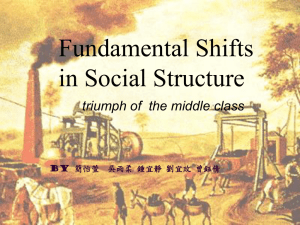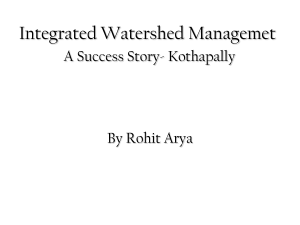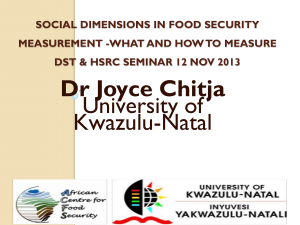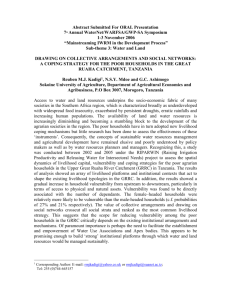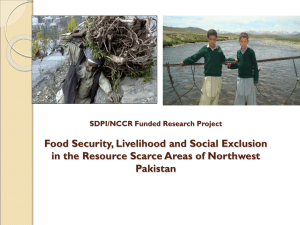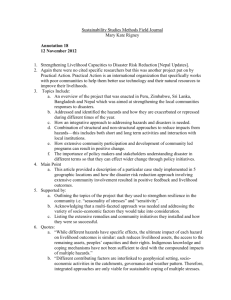Right Livelihood - Aberdeen Buddhist Group
advertisement
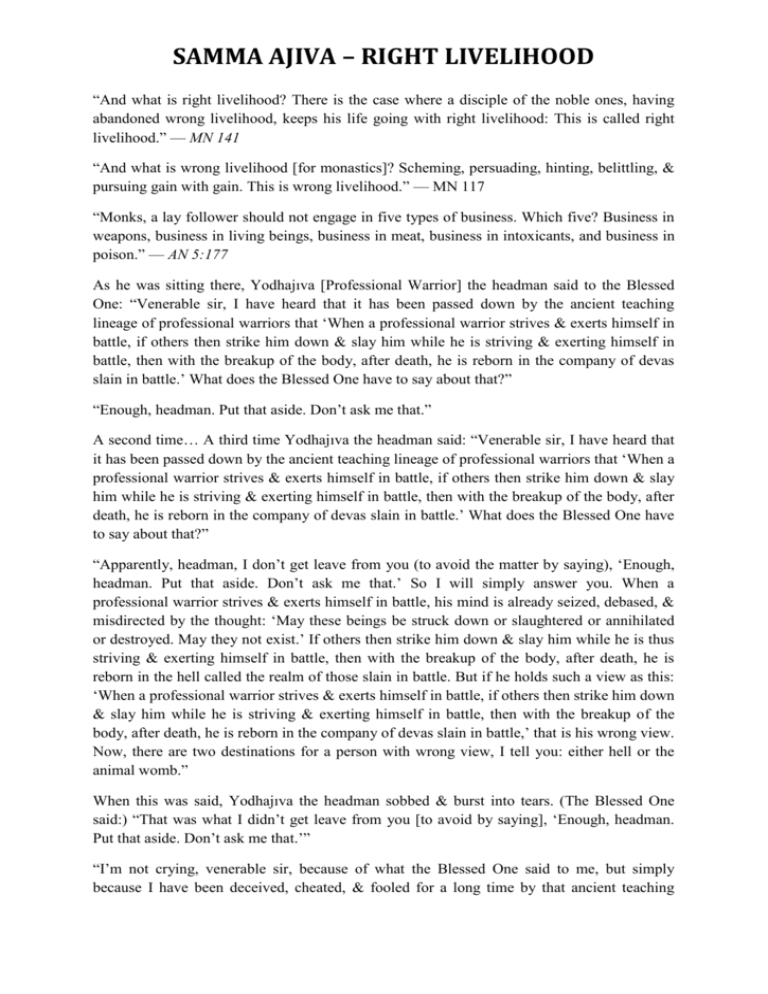
SAMMA AJIVA – RIGHT LIVELIHOOD “And what is right livelihood? There is the case where a disciple of the noble ones, having abandoned wrong livelihood, keeps his life going with right livelihood: This is called right livelihood.” — MN 141 “And what is wrong livelihood [for monastics]? Scheming, persuading, hinting, belittling, & pursuing gain with gain. This is wrong livelihood.” — MN 117 “Monks, a lay follower should not engage in five types of business. Which five? Business in weapons, business in living beings, business in meat, business in intoxicants, and business in poison.” — AN 5:177 As he was sitting there, Yodhajıva [Professional Warrior] the headman said to the Blessed One: “Venerable sir, I have heard that it has been passed down by the ancient teaching lineage of professional warriors that ‘When a professional warrior strives & exerts himself in battle, if others then strike him down & slay him while he is striving & exerting himself in battle, then with the breakup of the body, after death, he is reborn in the company of devas slain in battle.’ What does the Blessed One have to say about that?” “Enough, headman. Put that aside. Don’t ask me that.” A second time… A third time Yodhajıva the headman said: “Venerable sir, I have heard that it has been passed down by the ancient teaching lineage of professional warriors that ‘When a professional warrior strives & exerts himself in battle, if others then strike him down & slay him while he is striving & exerting himself in battle, then with the breakup of the body, after death, he is reborn in the company of devas slain in battle.’ What does the Blessed One have to say about that?” “Apparently, headman, I don’t get leave from you (to avoid the matter by saying), ‘Enough, headman. Put that aside. Don’t ask me that.’ So I will simply answer you. When a professional warrior strives & exerts himself in battle, his mind is already seized, debased, & misdirected by the thought: ‘May these beings be struck down or slaughtered or annihilated or destroyed. May they not exist.’ If others then strike him down & slay him while he is thus striving & exerting himself in battle, then with the breakup of the body, after death, he is reborn in the hell called the realm of those slain in battle. But if he holds such a view as this: ‘When a professional warrior strives & exerts himself in battle, if others then strike him down & slay him while he is striving & exerting himself in battle, then with the breakup of the body, after death, he is reborn in the company of devas slain in battle,’ that is his wrong view. Now, there are two destinations for a person with wrong view, I tell you: either hell or the animal womb.” When this was said, Yodhajıva the headman sobbed & burst into tears. (The Blessed One said:) “That was what I didn’t get leave from you [to avoid by saying], ‘Enough, headman. Put that aside. Don’t ask me that.’” “I’m not crying, venerable sir, because of what the Blessed One said to me, but simply because I have been deceived, cheated, & fooled for a long time by that ancient teaching lineage of professional warriors who said: ‘When a professional warrior strives & exerts himself in battle, if others then strike him down & slay him while he is striving & exerting himself in battle, then with the breakup of the body, after death, he is reborn in the company of devas slain in battle.’” — SN 42:3 Commentary – Bhikkhu Bodhi Right Livelihood is concerned with ensuring that one earns one’s living in a righteous way. For a lay disciple the Buddha teaches that wealth should be gained in accordance with certain standards. One should acquire it only by legal means, not illegally; one should acquire it peacefully, without coercion or violence; one should acquire it honestly, not by trickery or deceit; and one should acquire it in ways that do not entail harm and suffering to others. The Buddha mentions five specific kinds of livelihood which bring harm to others and are therefore to be avoided: dealing in weapons, in living beings (including raising animals for slaughter as well as slave trade and prostitution), in meat production and butchery, in poisons, and in intoxicants (AN5:177). He further names several dishonest means of gaining wealth which fall under wrong livelihood: practising deceit, treachery, soothsaying, trickery, and usury (MN 117). Obviously any occupation that requires violation of Right Speech and Right Action is a wrong form of livelihood, but other occupations, such as selling weapons or intoxicants, may not violate those factors and yet be wrong because of their consequences for others. The Thai treatise discusses the positive aspects of right livelihood under three convenient headings of rightness regarding actions, rightness regarding persons, and rightness regarding objects. “Rightness regarding actions” means that workers should fulfil their duties diligently and conscientiously, not idling away time, claiming to have worked longer hours than they did, or pocketing the company’s goods. “Rightness regarding persons” means that due respect and consideration should be shown to employers, employees, colleagues, and customers. An employer, for example, should assign his workers chores according to their ability, pay them adequately, promote them when they deserve a promotion and give them occasional vacations and bonuses. Colleagues should try to co-operate rather than compete, while merchants should be equitable in their dealings with customers. “Rightness regarding objects” means that in business transactions and sales the articles to be sold should be presented truthfully. There should be no deceptive advertising, misrepresentations of quality or quantity, or dishonest manoeuvres. From “The Noble Eightfold Path” by Bhikkhu Bodhi Commentary – Thanissaro Bhikkhu At first glance, it would seem strange that the Buddha list right livelihood as a factor of the path separate from right speech and right action. After all, livelihood is usually wrong if it violates the principles of right speech and right action, so why would it need a separate factor? However, there appear to be at least two reasons for why right livelihood is given a separate listing. The first has to do with the Buddha’s saying that all beings subsist on nutriment. Our 2 need for nutriment is so great that it tends to blind us to any harm we cause to ourselves and others through the way we gain that nutriment. Thus the Buddha wants to focus our attention directly on this problem so that we will become more sensitive to the way in which we cause harm in our search for food, clothing, shelter, and medicine. The second reason has to do with the effect of our livelihood on our own mind and on the minds of others. In the passages where the Buddha identifies soldiering and acting as inherent unskilful forms of wrong livelihood, it’s because of the unskilful mental states that these occupations foster. Thus right livelihood segues from issues of right speech and right action to the “concentration aggregate” of factors—right effort, right mindfulness, and right concentration—that focus on the training of the mind. If you’re going to train the mind in meditation, you don’t want your livelihood to be working at cross purposes to the types of sensitivity you want to foster in the mind. From ‘A Study Guide on the Noble Eightfold Path’ by Thanissaro Bhikkhu Discussion Questions 1. The Buddha identified two types of wrong livelihood: following an occupation that’s inherently unskilful, and following a potentially good occupation but in a dishonest way (see the discussion in MN 97). Two of the inherently unskilful occupations mentioned in the texts are soldiering—which inherently gives rise to greed, anger, and delusion within oneself—and the type of acting that provokes greed, anger, or delusion in others. What other types of occupation at present do you think would fit under these guidelines? What forms of trade would you add to the list of five unskilful trades mentioned in the texts? 2. The Buddha draws a sharp distinction between right livelihood for monastics—who live off the generosity of others—and for lay people. For instance, “pursuing gain with gain” means offering something to someone in hopes of receiving something of greater value in return, which is a typical way in which lay people make their living. Why do you think that the standards for monastics are higher in this regard? 3. The Buddha shows great discretion in telling people that their occupation is inherently unskilful. Why do you think this is so? 4. What are some of the potential pitfalls in the occupation you have chosen? In what ways can people practice it in a dishonest or harmful way? How do you ensure that you don’t fall into these pitfalls? How do you deal with people who are less scrupulous in their pursuit of the same livelihood? Questions from ‘A Study Guide on the Noble Eightfold Path’ by Thanissaro Bhikkhu 3
